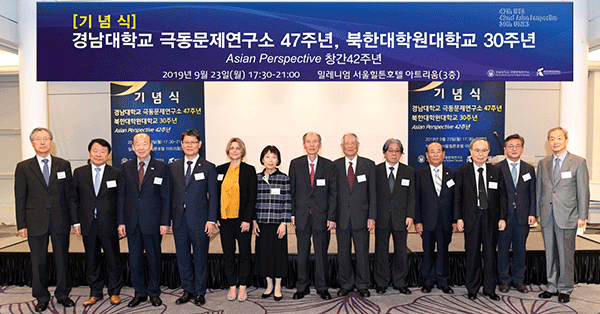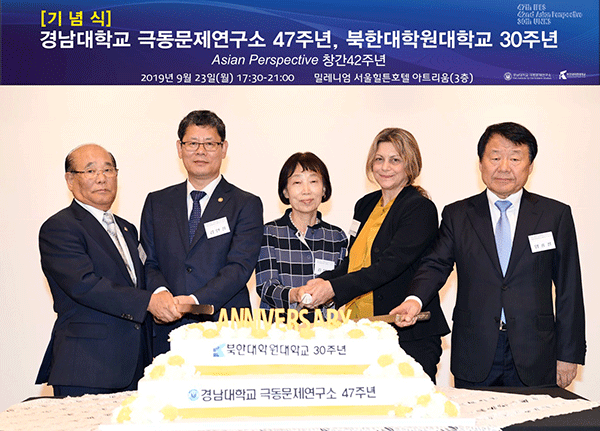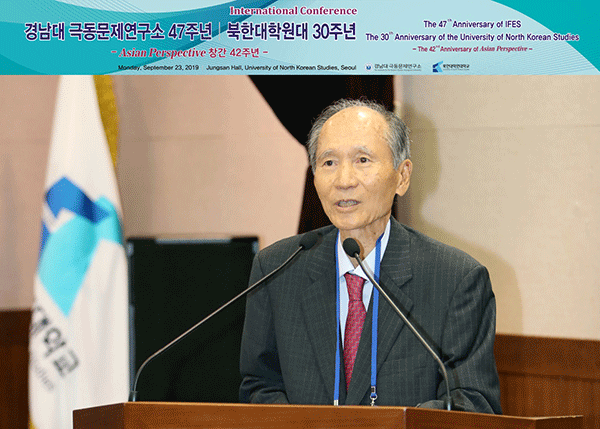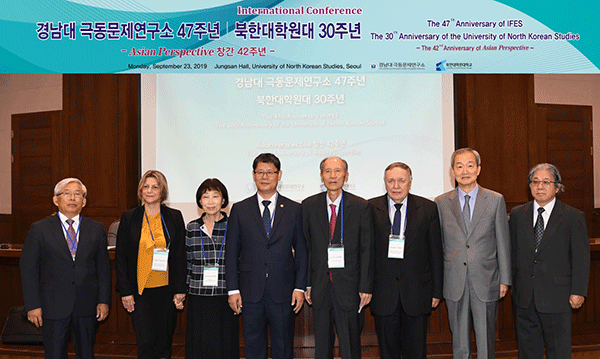President of Kyungnam University affirms guiding role on N. Korea, unification issues
By Senior Editor Kim Hyung-dae with Reporter Ms. Kim Jin-sun
“The Institute for Far Eastern Studies of Kyungnam University and the University of North Korean Studies have focused on developing North Korea and unification studies as a discipline and on fostering talented people in this field,” said Park Jae Kyu, President of Kyungnam University and former Minister of Unification of the Republic of Korea.
“In the future, we will further our academic research and educational efforts on North Korea and unification issues, and play a guiding role in presenting new policy directions.”

Park Jae Kyu, who is also the founder of the University of North Korean Studies (UNKS), made the remarks on September 23 in his opening speech at an international academic conference marking the 47th anniversary of Kyungnam University’s Seoul-based think-tank the Institute of Far Eastern Studies (IFES), 30th anniversary of the UNKS, and 42nd anniversary of the founding of Asian Perspective—an internationally recognized English-language journal of social sciences published by IFES.
“There have been many achievements through the inter-Korean summits and the U.S.-North Korea summits, but many problems still need to be resolved,” Park said. “Considering the current situation in Northeast Asia, improving the inter-Korean relations and the U.S.-North Korea relationship are all the more necessary if we are to structurally resolve the issues.”
Park also stressed the need for in-depth discussions on how we should picture a peace settlement on the Korean Peninsula and the region’s future in light of the complexity and changing dynamics among the actors in East Asia.
In a keynote speech, Minister of Unification Kim Yeon Chul expressed expectations for U.S.-North Korea working-level talks, which are expected to resume soon, but cautioned that it would not be easy to narrow the gap between the two sides. “In the process of creating peace on the Korean Peninsula, there are certain roles that inter-Korean relations should play,” Minister Kim said. “The South Korean government will also play a role in advancing the North Korea-U.S. working-level talks . . . and utilize various means to improve the relations between South and North Korea.”
“The Institute for Far Eastern Studies and the University of North Korean Studies will continue to lead research and education on international issues including North Korea and unification,” said President Park.

Following the opening ceremony, Kyungnam University professor Lee Su-Hoon, who served as ROK ambassador to Japan, presided over the first session of the conference, which featured a co-chairs debate under the title ‘Changes in East Asia and the Future of the Korean Peninsula’. At the session, Carla P. Freeman, a director and professor at the Johns Hopkins School of Advanced International Studies (SAIS) in Washington D.C., suggested that it is “too early” to expect that the relevant parties can resolve the problems we face on the Korean Peninsula, including the nuclear issue, solely through U.S.-DPRK high-level leadership summitry. She further emphasized that a greater diplomatic effort would be needed.
Commenting during the session’s debate, Masao Okonogi, a professor emeritus at Keio University in Japan, pointed out that realizing a balance of power in Northeast Asia is most important to achieve peace on the Korean Peninsula. With regard to the current diplomatic progress on the nuclear issue, he stated, “I think there is an intention among U.S. government officials recently to distinguish the complete denuclearization of North Korea from a complete freeze [of North Korea’s nuclear program],” and that “we need to see if the position of the [Donald] Trump administration, which has stuck to a ‘big deal’ approach, is changing.”
Providing a Chinese perspective, Professor Jin Jingyi of Beijing University said that “If the U.S. and China link the Korean Peninsula issue to their interests, the issue cannot be resolved.” An expert on Korean Peninsula affairs, he suggested that “By lifting sanctions against North Korea, we could resolve the nuclear issue by putting the North into the sea of market economy.”
Alexander Zhebin, Director of the Center for Korean Studies at the Russian Academy of Sciences, gave his expert opinion as well. “The North Korean government can provide more things to its people through economic reform, but we don’t expect any radical changes to take place,” he said, adding that from a geopolitical perspective, concerned parties should consider whether Beijing would be willing to give up North Korea, which serves as a buffer zone for China, in light of relations in East Asia, which feature an escalating trade war between the U.S. and China.
Later in the day, Yang Moon-Soo, Vice President of the University of North Korean Studies, presided over the conference’s second session, which examined the challenges facing North Korean studies as a discipline. Presentations were provided by professors Kim Young Soo of Sogang University and Lee Woo Young of UNKS. Among the session’s panelists were Ahn Hoyoung, President of the University of North Korean Studies (former ROK ambassador to the US); Choi Wan Kyu, Chair Professor of Shinhan University (former president of the UNKS); Park Sun Song, Professor of North Korean Studies at Dongguk University; Choi Dae Seok, Executive Vice President of External Affairs at Ewha Womans University; and Yoo Ho Yeol, Professor of North Korean Studies at Korea University.
Held in celebration of the three anniversaries, the conference was attended by some 200 people, including ambassadors and service officers of various foreign embassies in South Korea.
President of Kyungnam University vows to lead study, education on North Korea and unification issues
Event commemorates 47th Anniversary of the Institute for Far Eastern Studies of Kyungnam University and 30th Anniversary of the University of North Korean Studies
“Kyungnam University’s Institute for Far Eastern Studies and the University of North Korean Studies will continue to lead research and education on international affairs, including those pertaining to North Korea and unification issues,” said Park Jae Kyu, President of Kyungnam University and former Minister of Unification.
Park stressed these matters in his greetings at a ceremony held on September 23 at the Millennium Hilton Hotel in central Seoul to mark the 47th anniversary of Kyungnam University’s Institute for Far Eastern Studies (IFES), 30th anniversary of the University of North Korean Studies (UNKS), and 42nd anniversary of the founding of Asian Perspective—an academic journal of international and East Asian affairs published by IFES.

“When Kyungnam University decided to open a research institute in Seoul 47 years ago in order to research North Korea and unification issues, I think more people were apprehensive rather than enthusiastic,” said Park. “But today, 47 years later, the university’s Institute for Far East Studies is on par with leading domestic and foreign research institutes in terms of its research capabilities.”
The decision to open IFES was not the only educational venture undertaken by Park that raised eyebrows. “When we opened a department of North Korean studies within Kyungnam University’s Graduate School of Public Administration in 1989—an undertaking that virtually marks the origin of the University of North Korean Studies—there were also many skeptics,” according to Park. “However, UNKS has established itself as one of the best and most exemplary educational institutions for the study of North Korea.”
“The Institute for Far Eastern Studies of Kyungnam University and the University of North Korean Studies will continue to reciprocate your encouragement and support by providing high-quality education and research that contributes to the realization of a desirable future for the Korean Peninsula,” he said.
“I hope the IFES and the UNKS will play a central role in achieving unification—the long-cherished dream of the Korean people—by making good use of the academic foundations they have built,” Lee Ju-young, Vice Speaker of the National Assembly, said in a congratulatory speech at the ceremony.
In his own congratulatory remarks, which touched on the current situation on the Korean Peninsula, incumbent Minister of Unification Kim Yeon Chul delivered similar sentiments: “We expect Kyungnam University’s Institute for Far Eastern Studies and the University of North Korean Studies to offer their wisdom—as they have done over many years—to help us overcome the obstacles we face.”

Other distinguished speakers at the ceremony lauded both organizations’ mission and work. “I think it is great to train people who will help pave the way for Korean unification as well as for inter-Korean dialogue,” former unification minister Kang In-duk said. “To work toward unification and improve inter-Korean relations, we need a lot of talent, and Kyungnam University’s Institute for Far Eastern Studies and the University of North Korean Studies are doing something about that.”
In his tribute to the two institutes, Rep. Hong Ik-pyo of the Democratic Party of Korea associated their beginnings to key moments in history. “[The] two institutions . . . symbolize the history of the Korean Peninsula. This is because the Institute for Far Eastern Studies of Kyungnam University was opened in 1972, when the July 4th South-North Joint Communiqué was issued, and the University of North Korean Studies was initially launched at a historic time when the global trend was toward ending the Cold War.”
More than 150 people, including former and current leaders of political, government and academic circles, attended the ceremony.

